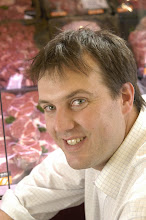This has to be one of the more annoying topics that seems to be cropping up on a more and more regular basis. It seems like the extremist animal libbers have found something so complex that their simple babble of "go veg save the planet" cannot be undone by a simple one liner in retort which in today’s "5 sec sound grab" world means that the argument against goes unheard.
As someone who both loves the planet as well as grows and sells meat the notion that eating the product we grow and sell could cause the end of the world as we know it is something worth investigating but I didn't have to go far to basically debunk this statement.
To begin with Lifecycle analysis of the carbon emissions of fish, poultry (and locally in Australia kangaroo) show that all three have lower emissions than coffee, sugar, oils and fresh veg (Wallen et al 2004). In fact a UK study (Fray and Barrett 2007) showed that while there was a carbon emissions benefit to vegetarianism over the average British diet it was only 9% better than just swapping to a healthy locally sourced diet (think CSIRO Healthy living diet)
Compounding the myth is the fact that all these emissions are done with no offset taken into account, as the offsets in agriculture are a notoriously difficult thing to quantify at a farm level, due to measurement issues. However it is indisputable that different farming techniques can add or detract from soil carbon content - thus decreasing or increasing atmospheric carbon.
The basic message delivered here also fails to take into account the ability of developing technology to improve the way we do things. There are a multitude of projects that will reduce emmissions from ruminants that I am aware of including feeding garlic to livestock to reduce emmissions (www.mootral.com) to use of kangaroo gut bacteria in ruminants to pasture sprays to breeding specific genetic lines for lower emmisions
In addition livestock farming is one form of farming that is managed in much more harmony with biodiversity. While field crops and horticulture are grown in vast monocultures with regular sprays of herbicide and pesticide and vertebrate vermin control in general pasture based systems retain trees, shrubs and have minimal input in the form of sprays etc.
Also while we are "saving the planet" we need to ask the question of what will happen to the ungrazed grassland which would be created if we no longer had ruminants grazing them. leaving alone the increased fire risk (which we have seen the devastating consequences of in Victoria recently)the grass has to do something which is rot away - while more grass is undoubtedly grown in a grazing situation than ungrazed the grass that is left has to decompose. If this occurs in an anaerobic situation as much of it will then the decomposing grass will give off methane exactly as if consumed by a cow. More to the point especially in Northern Australia if this grass is eaten by termites then methane will definately be given off giving no benefit over ruminant grazing.
So as a grower who manages their property to increase their soil carbon and has retain large swathes of trees (on our farm we have nearly 2 million trees) and shrubbery and minimising fire risk to my neighbours am I "killing the planet" - no way. And are the "Go Veg save the planet" crew running one big massive con - you would have to say - unavoidably so - TOO BLOODY RIGHT
Top 5 Rosemary Recipes For ANZAC Day
8 hours ago

.png)



